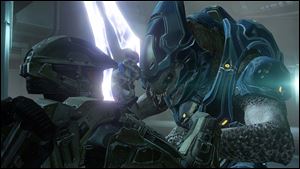
Halo 4's Master Chief is human after all
11/8/2012
A scene from Halo 4.
Technology-enhanced super-soldier Master Chief has always been efficient, even by military standards. Drop the Halo protagonist on any alien-infested setting featured in the last three games and he can make it safe for human colonization.
For Halo 4, though, the first in the blockbuster Xbox series to be developed entirely by Microsoft, the game's action hero is suddenly confronted with a problem that can't be obliterated by human or alien weaponry: loneliness.
Master Chief, who is essentially to the Xbox ecosystem what Mario is to the Nintendo universe, begins the game adrift, lost in space, with nary a response to his ship's distress signal.
It's where Halo 3 left off, and Microsoft's 343 Industries adds new facets to the narrative by infusing a sense of humanity to the line-'em-up, shoot-'em-down franchise instead of simply altering game play. Though Halo lore has been explored in novels, comic books and more, a Halo game has never before focused so squarely on the mythology and emotions driving Master Chief, the quiet, solemn hero at gamers' behest.
His relationship with the curiously fetching Cortana, an artificially intelligent computer program who looks born from a sci-fi version of America's Next Top Model, is the central driving facet of Halo 4. Cortana is suffering from rampancy, a sort of reverse take on planned obsolescence in which the software starts to disintegrate from becoming too smart and too sentient for its own good.
It's an imagined future where your Windows operating system or latest iPhone starts to crumble for becoming more intelligent than you. "We literally think ourselves to death," Cortana says mid-game to Master Chief. His motivating factor is to save his companion while struggling with his own emotional attachment to her.
As Cortana becomes more lifelike -- she has, it's worth noting, the ability to navigate unfriendly terrain via teleportation but not the foresight to program herself some non-opaque clothing -- 343 Industries has slowly redirected the franchise into one that's starting to grapple with bigger questions than what the alien Covenant Empire is after. The topics may be familiar to sci-fi fans, but it's telling that Halo 4 begins with a dialogue-heavy scene that questions the military ethics behind the program that sprung Master Chief.
Microsoft's 343 Industries could have tried to assert itself by making Halo 4 more complex, adding gun upon gun, armor trinket upon armor trinket, and action sequence upon action sequence. Instead, Halo 4 remains blissfully simple in its accessibility. Master Chief can hold two weapons, and there's an assortment of vehicles and hover craft to try out. While playing the game at its highest difficulty setting is a chore, Halo 4 puts cinematic fluidity ahead of inventory-management madness.
Even the music seems remade to reference modern action films. Composer Neil Davidge, who works often with British trip-hop collective Massive Attack, moves away from thematic and orchestral flourishes to focus almost exclusively on atmosphere, crafting a score that fits this introspective Halo.
Microsoft in the past has attempted to make a big-screen version of Halo, but Halo 4 is more primed than other titles to make that jump as noted by everything from its Hans Zimmer-esque music to a more simplified focus on character.
One needn't be up on all the Halo terminology. For in Halo 4, the poor Master Chief, while still an ace member of the military, seems increasingly out of place even among his United Nations Space Command team.
Thought left for dead at the end of Halo 3, Master Chief is greeted with the dismissive, "I thought you'd be taller" by a fellow soldier. He has no response, but has the last laugh when slipping into the giant, rocket-launcher-equipped Mantis tank-like suit.
Make no mistake, this is a sci-fi war game, and it is again presented in all its Star Wars meets Starship Troopers glory. Still, it's more than a quarter into the game before the central villain appears. He is the Didact, and he looks like the sort of evil that Captain Picard dealt with in Star Trek: Nemesis, but his arrival is largely just a nuisance in Master Chief's quest to get Cortana home.
Doing so means first having to explore the alien planet of Requiem, and Halo 4 traverses the planet's core, its forests and its deserts. There are lava-drenched caves to sneak around and fog-ridden greenery to navigate.
Developed in-house by a Microsoft team and coming near the end of the console's life cycle -- a new iteration of the Xbox is expected in the next year or so -- it's not a surprise that Halo 4 takes full advantage of the system's engine.
What's striking is how gorgeously smooth it all unfolds.
Playing through the game's eight campaign missions resulted in nary a glitch, and though there are times when the map-less Master Chief will run in circles around the landscapes, Halo 4 uses shading, lights, and the presence of enemies rather than the customary go-here arrows to point the way forward.
Already 343 Industries has spoken of having Halo titles mapped out for a potential 15 or 20 more years, and Halo 4 boldly reinvigorates the series by what it doesn't change. All the controls, for instance, are comfortably familiar to anyone who has a played a prior game.
Yet by the time Halo 4 reaches its conclusion, it's in unknown territory for the franchise. Like Cortana, Master Chief suddenly seems capable of thinking himself to death.
Earlier in the game the stoic and confident Master Chief tried to calm her, assuring her that he will indeed cure her. And if not, she asks? For the first time in the "Halo" series, Master Chief isn't just a man of few words, he's speechless.